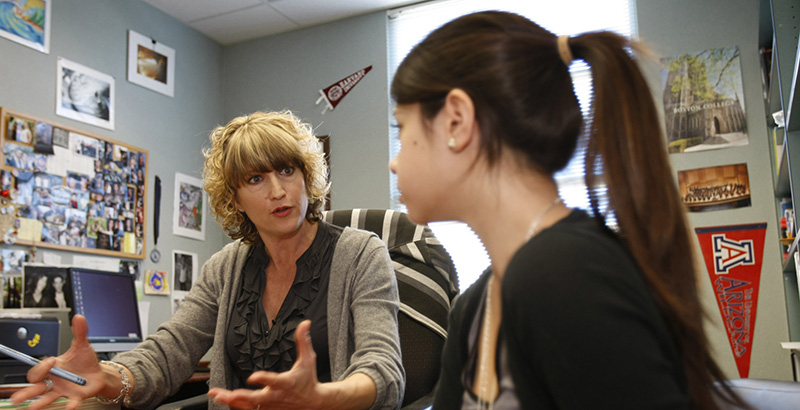Taylor & Goodman-Scott: School Counselors Are Key to Creating a Safe Place for Students. They Need More Support to Make This Happen

Across the country, districts are implementing hastily installed, fear-based security measures in schools as a response to mass shootings that, while horrific, are far from an everyday occurrence. Despite evidence that it negatively impacts school climate and safety, teachers are being armed, bulletproof backpacks are marketed as a back-to-school fashion trend and entire schools are required to participate in active shooter drills, including live simulations with intruders, victims and weapons.
During one such drill in Indiana last spring, teachers were shot with pellet guns. During another, in Dayton, Ohio, shotgun blanks were fired and school counselors needed to be on hand to help students process trauma intentionally inflicted on them. We are subjecting our youth to a culture of constant hypervigilance and fear. But this is largely unnecessary.
As the Washington Post points out, schools are among the safest places for our children. Research indicates that homicides are 10 times more likely to occur in restaurants and 200 times more likely in private residences. Research also shows that following a different path, giving students access to a school counselor, improves academic and postsecondary outcomes, attendance rates, behavior — and student safety.
State-licensed school counselors are mental health professionals with specialized training to work in educational settings. They can support students in addressing the social-emotional needs integral to their success and be the first line of defense in helping students who are in distress and may be tending toward violence. Yet 80 percent of students who need mental health services do not receive them.
One reason is that 14 million students attend a school that prioritizes police over any school counselors, psychologists, social workers or nurses. In schools that do have counselors, they are often saddled with overwhelmingly high caseloads. While the American School Counselor Association recommends one school counselor for every 250 students, the average ratio is nearly double that. And many are asked to perform additional tasks that have nothing to do with counseling, like coordinating standardized tests, acting as substitute teachers and serving as lunchroom monitors — all while a wait list of students in crisis continues to pile up. This is a disservice to students in need and does not make fiscal sense.
We must invest in funding to lower student-counselor ratios and remove non-counseling duties to improve students’ access to care. Sen. Ron Wyden’s Elementary and Secondary School Counseling Act, for example, would provide dedicated funding to bring the ratio down. Consider what would be possible with five-year, renewable federal grants to school districts across the country to expand mental health services and staffing.
Further, schools must give counselors the time and space to provide prevention-focused services for students in crisis, and we must educate stakeholders — superintendents, administrative teams, teachers, parents/caregivers and students — on the proper roles and functions of school counselors, and utilize them accordingly. If students believe they should go to a counselor only when they need a schedule change, they are not likely to reach out when a mental health emergency is looming. We can do better.
One in 6 school-age children in America will experience a diagnosable mental health condition each year, but only 1 in 5 of those in need can access treatment. If 80 percent of students with strep throat could not get medical help, we would have a massive public health crisis. We would never let that happen.
Dr. Julia V. Taylor is an assistant professor of counselor education at the University of Virginia Curry School of Education. Dr. Emily Goodman-Scott is an associate professor of counseling and human services at Old Dominion University. They currently serve as assistant chair and chair, respectively, of the Virginia School Counselor Association Board of Directors.
Get stories like these delivered straight to your inbox. Sign up for The 74 Newsletter

;)